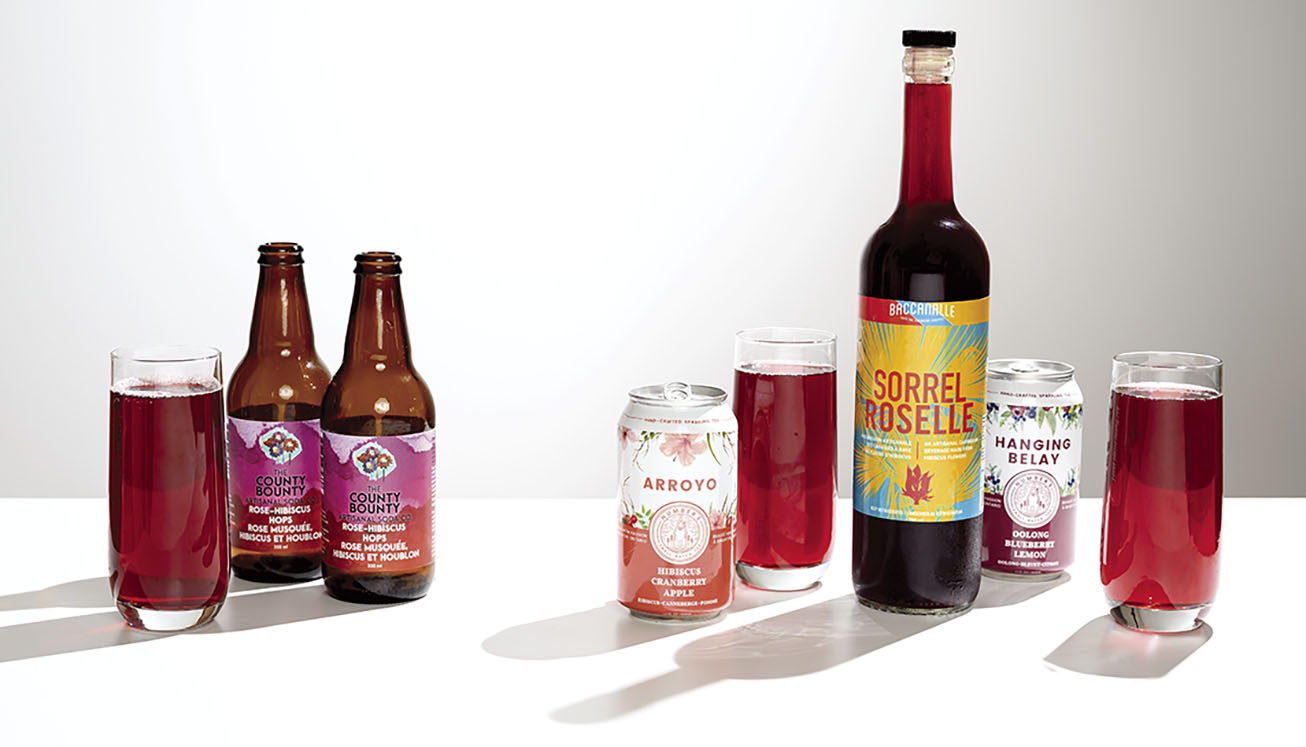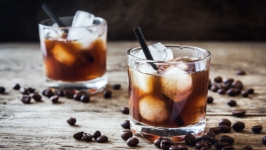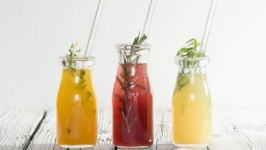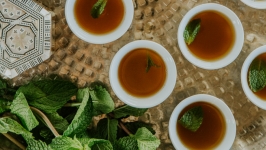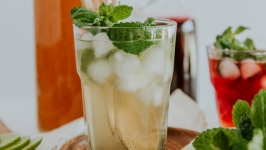Oh So Drinkable Hibiscus
Baccanalle — Caribbean Sorrel
Don’t try to argue the semantics of sorrel with Resa Solomon- St. Lewis, chef-owner of Baccanalle. Caribbean sorrel, made with hibiscus, is one of Baccanalle’s signature products — and it is not to be confused with the leafy green and tart sorrel plant.
There are more than 100 varieties of hibiscus that have been used to make drinks around the world. In Egypt, there’s karkadeh tea. In Latin America, there’s agua de jamaica. Then there's Carribean sorrel— the drink — a hibiscus flower-based beverage that's brewed with ginger, a little brown sugar and aromatic spices. Solomon-St. Lewis finds it similar to cranberry, in that it’s sour and a little bitter, but the balance is different, she says. The strong floral taste of the hibiscus gets punched up by the clove and cinnamon aftertaste. Though it’s a traditional holiday drink spiked with a little rum, Solomon-St. Lewis enjoys adapting her Trinidadian roots to a Canadian context.
“People within the community would say, ‘Why are you selling sorrel now? It’s not Christmas time.’ And we [would say], ‘Why should we keep it just to Christmas?’” She makes sorrel spritzers, sorrel-tinis and, in winter, is even a proponent of mulled sorrel. “Traditionally, you don’t drink it hot, because it’s in tropical countries. But there’s no reason why we can’t.
”Despite these adaptations, her sorrel received the stamp of approval from the Trinidadian Tourism Board after competing for the country in Ottawa’s Embassy Chef Challenge. “People from Trinidad are foodies.
"They cook quite well. They’re very discerning,” she says proudly of how her community embraced her drink."
"The challenge of making good sorrel is getting the clarity and the finishing taste right, according to Solomon-St. Lewis, and there are always variables to consider when brewing it. “You cannot dictate the exact flavour that you’re going to get out a flower,” she says. However, Solomon-St. Lewis’ background as a chemical engineer for the government has helped. “A lot people that are in chemistry have a passion for food. If you think about reactions and the different inputs and outputs you’re putting in, it’s a very similar concept to recipes and product,” she says. “Because I’m also a local producer, I get to put those things together in a deliberate way."
She worked for the government, the private sector, and back to the government, until she lost her job, an unintended launching pad into something new. But even before then, she had considered a career in cooking, so she entered Algonquin’s culinary management program. “Sometimes there are silver linings,” she says.
After starting four years ago at the Beechwood Farmers’ Market as a local producer who did specialty Caribbean foods, condiments and catering, she finally opened her own space, the Capital Fare Café, in 2017."
"It took some time for people to learn about sorrel, but it has since" become a well-liked product. “From the artisan and craft thing, it’s something unique,” she says. People can understand where it’s coming from. In that case, with the sorrel, people are so interested in the fact it’s a drink made with flowers, and that’s something that’s really exciting and different. Of course, they also love the taste.”
Baccanalle
baccanalle.com| 613.859.6297 | @baccanalle
County Bounty— Artisanal Sodas
Dodie Ellenbogen likes to joke that she started a soda company by accident. As an organic vegetable farmer in Prince Edward County, she had never thought about making drinks until a friend dropped off a batch of strawberries that were about to go bad. “I think she assumed that I could can them because I’m a farmer, but I hate making jams and canning,” says Ellenbogen. A recipe for cordials popped up while searching for alternative preserving methods, and with the help of her brewer husband, Michel Desjardins of Mackinnon Brothers Brewing, she made their first batch of strawberry basil soda.
Since then, The County Bounty’s line of six main artisanal sodas has expanded from Prince Edward County across Ontario and is now sold in stores from Toronto through the Bay of Quinte and up to Ottawa. Featuring all-natural ingredients and primarily local fruit and herbs, their sodas are a refreshing, complex alternative to store- brand pop, and lend themselves to enhancing cocktails.
“I really like to focus on the sweet-sour combo,” says Ellenbogen. “The flavours I really get into always have some sort of wacky thing going on in your mouth where you’re not sure if it’s sour or sweet. I recently made one that’s got boiled lemon and lime peels and it’s super bitter. It’s almost like drinking an IPA where [you think], ‘This is so good, but so bitter.’”
The Rose-Hibiscus Hops tonic blends floral notes with a touch of bright acidity. While the Raspberry Lime is the most popular, the Roadside Botanical Flavour is aromatic and tangy with a dry finish, and the Sour Cherry Mint has a lovely minty smell, but keeps a low profile that lets the tart cherry shine through. In addition to using real fruit, the herbal notes that tinge the different sodas is what differentiates County Bounty from other craft brands of pop. Though it offers a few seasonal sodas alongside its regular line, not every experiment has worked out. “The things that taste like straight chlorophyll aren’t that good,” she says. Black currant leaf, though it smells good, does not work well, apparently. “It’s all just my crazy imagination and just trying disgusting things until they turn out.”
Their biggest clients have been wineries, who want to stock quality non-alcoholic choices for visitors who don’t drink, but are tagging along on a wine tour, and Ellenbogen says they’ve sold to places such as Wellington Gastropub for cocktails.
Discovering the possibilities of artisanal sodas may have been a happy accident for Ellenbogen, but they have now become her main business. She’s partnered with Sobeys to sell her sodas in 12 stores in the Ottawa area and SuzyQ Doughnuts.
Her learning curve has been steep, but she’s glad she came into farming and soda production without much experience in either. “It’s one of those situations where you don’t know what you [don't] know — and you just do it.”
County Bounty
thecountybounty.com| 613.806.6936 | @thecountybounty
Number E Tea — Sparkling Tea
Before they found themselves in the sparkling tea business, the dream for Sarah Pelletier and Chris Auger had been to own a coffee shop.
Wherever they travelled, they made a habit of visiting local cafés with a plan to one day open one themselves. But they also had full time jobs; Auger was in the military and Pelletier was a nurse. Still, to get an understanding of coffee, Pelletier became a barista. Truth told, she wasn’t a big tea drinker until she stumbled on a tea sommelier course from the Tea and Herbal Association of Canada. And now? “Everything that surrounds tea I just fell in love with.”
The online courses featured a wide array of samples and included a final exam in Toronto that had oral, written and blind taste tests. The cultures, the processes, the different kinds of tea and their various subcategories gripped her during her course. “For me, if I want to start something, I want to learn everything about it,” she says. Where the coffee industry has well established players, Pelletier and Auger saw a gap in the market for single-estate teas and cold-brewed drinks.
Two years later, they came out with their sparkling teas along with their single-estate loose-leaf teas. Currently, there are two sparkling tea flavours: Hibiscus Cranberry and Apple, and Oolong Blueberry Lemon. The idea for sparkling tea came through observing various coffee trends — notably nitro coffee — and trying out homemade soda in Quebec City. “People are looking for something different instead of having a Pepsi or Coke,” she says, adding that the tea is made with loose leaf and not with concentrates. The two teas also contain smaller amounts of sugar than most pops, only 14 grams and 13 grams respectively.
Their palate for teas has developed over their travels. They first went to India to make connections with estates and were blown away by the experience. “They were so proud of what they were doing. Everything was on a small scale, made by hand,” she says. “You see all the work that is done to get the product to your cup.” They’ve since travelled to Nepal, Sri Lanka and plan on visiting Japan soon. “When you travel, you get to taste what other people do. And then you come home and try it.”
They’ve been selling their sparkling teas in Prince Edward County and the Quinte area, as well as in parts of Toronto. Chris is considering the prospects of expansion, and will be meeting with people in Ottawa, but his approach to growth is a deliberate one. “I’m trying to do everything right, so that’s why I’m taking my time.”
Having been in health care for 20 years, Sarah had to learn a lot on the fly. “There’s no canning for dummies book available yet,” she jokes. They also had to build their own pasteurizer and get it CSA- certified. But seeing the work the tea farmers put into their product has inspired them to push through.
There’s green mint tea and a cucumber sparkling drink is on the way, and a fourth is in early development. The experience of running a business and all the work involved has “just been a bit overwhelming, but it’s fun in a nice way.”
Number E Tea Company
numberetea.com| @numberetea


